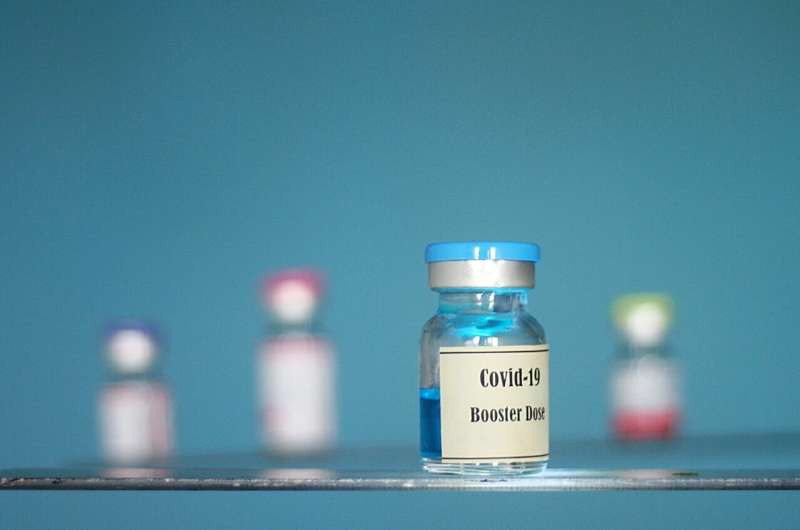This article has been reviewed according to Science X's editorial process and policies. Editors have highlighted the following attributes while ensuring the content's credibility:
fact-checked
peer-reviewed publication
trusted source
proofread
Patients can interrupt immune-suppressing medicines to boost immunity provided by COVID-19 booster, finds study

A major clinical trial, led by experts at the University of Nottingham, has shown that people with inflammatory conditions are able to improve the antibody response from a COVID-19 booster vaccination by interrupting their treatment for two weeks immediately after having the vaccine.
The antibody response to the jab was doubled at four weeks, and one and a half times greater at 26 weeks, when compared to those who continued with their treatment as usual. The improved antibody response lasted for six months.
Patients who interrupted treatment reported experiencing more flare-ups of their inflammatory conditions in the next few weeks, but most flares were self-managed, and most didn't need help from a health care provider.
The interim findings of the Vaccine Response On Off Methotrexate (VROOM) trial (which was restricted to 250 patients and followed up for 12 weeks) were previously published in Lancet Respiratory Medicine. They have already influenced the British and American clinical guidelines.
The full trial findings from 383 participants, which are published in Lancet Rheumatology, show that the improved protection lasts for six months. The full trial also shows that the blood from people who stopped methotrexate was also more efficient at killing the Wuhan strain and the omicron BA.1 variant. It also shows that when the six-month follow-up period was considered, there was no excess risk of disease flares in patients who suspended their treatment immediately after a COVID-19 booster vaccination.
These findings will be useful for national immunization advisory committees, and other specialist societies formulating recommendations on the timing of vaccination in those treated with or starting medicines that turn down the immune system.
The VROOM trial recruited patients with a range of inflammatory conditions treated with methotrexate. Methotrexate is the most used immune-suppressing drug, with around 1.3 million people in the UK prescribed this medicine for inflammatory conditions such as rheumatoid arthritis, and skin conditions such as psoriasis.
Many of them were among the 2.2 million clinically extremely vulnerable people advised to shield during the first phase of the COVID-19 pandemic, depending on specialist advice and on their risk factors.
While methotrexate is effective at controlling these conditions and has emerged as first-line therapy for many illnesses, it reduces the body's ability to fight infections and the ability to generate a robust response to flu and pneumonia vaccines, including those against COVID-19.
Chief Investigator, Professor Abhishek at the University of Nottingham and Honorary Consultant Rheumatologist at Nottingham University Hospitals NHS Trust, said, "COVID-19 has not gone away, and with the emergence of new variants, and vaccine hesitancy among patients, it is important to optimize durable protection in people who are susceptible to COVID-19. Evidence from our trial will help patients and clinicians make informed choices about the risks and benefits of interrupting methotrexate treatment around the time of vaccination against COVID-19."
Professor Danny McAuley, Scientific Director for NIHR Programs, said, "As winter approaches, millions of people with compromised immune systems are still vulnerable to becoming unwell from COVID-19, despite the disease being less prevalent than it once was.
"This important research provides even more high quality evidence that by managing medicines in relation to vaccinations we can keep patients healthier while reducing pressure on the NHS."
The study was carried out in collaboration with colleagues from the University of Manchester, Imperial College London, the University of Oxford, Queen Mary University London, UK Health Security Agency (formerly Public Health England) and participating NHS hospitals. The study was managed by the Oxford Clinical Trials Research Unit (OCTRU).
More information: Effect of a 2-week interruption in methotrexate treatment on COVID-19 vaccine response in people with immunemediated inflammatory diseases (VROOM study): a randomised, open label, superiority trial, The Lancet Rheumatology (2023). DOI: 10.1016/S2665-9913(23)00298-9


















